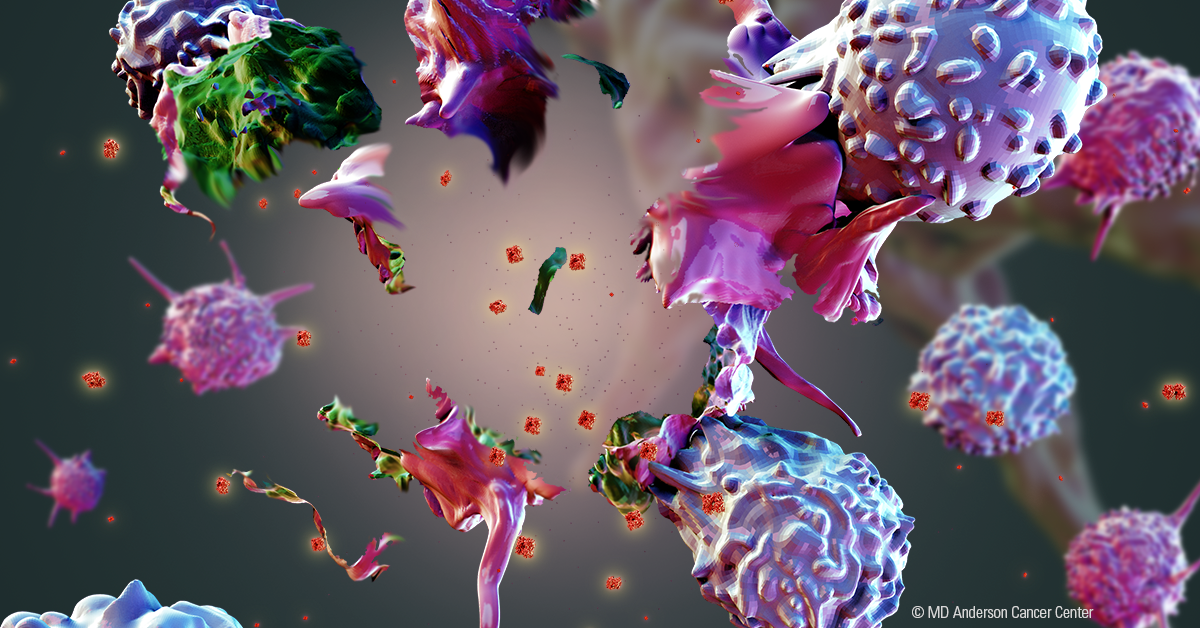- Diseases
- Acoustic Neuroma (14)
- Adrenal Gland Tumor (24)
- Anal Cancer (68)
- Anemia (2)
- Appendix Cancer (16)
- Bile Duct Cancer (26)
- Bladder Cancer (72)
- Brain Metastases (28)
- Brain Tumor (232)
- Breast Cancer (714)
- Breast Implant-Associated Anaplastic Large Cell Lymphoma (2)
- Cancer of Unknown Primary (4)
- Carcinoid Tumor (8)
- Cervical Cancer (158)
- Colon Cancer (166)
- Colorectal Cancer (116)
- Endocrine Tumor (4)
- Esophageal Cancer (44)
- Eye Cancer (36)
- Fallopian Tube Cancer (8)
- Germ Cell Tumor (4)
- Gestational Trophoblastic Disease (2)
- Head and Neck Cancer (12)
- Kidney Cancer (128)
- Leukemia (340)
- Liver Cancer (50)
- Lung Cancer (286)
- Lymphoma (278)
- Mesothelioma (14)
- Metastasis (30)
- Multiple Myeloma (100)
- Myelodysplastic Syndrome (60)
- Myeloproliferative Neoplasm (4)
- Neuroendocrine Tumors (16)
- Oral Cancer (100)
- Ovarian Cancer (172)
- Pancreatic Cancer (160)
- Parathyroid Disease (2)
- Penile Cancer (14)
- Pituitary Tumor (6)
- Prostate Cancer (146)
- Rectal Cancer (58)
- Renal Medullary Carcinoma (6)
- Salivary Gland Cancer (14)
- Sarcoma (238)
- Skin Cancer (294)
- Skull Base Tumors (56)
- Spinal Tumor (12)
- Stomach Cancer (64)
- Testicular Cancer (28)
- Throat Cancer (92)
- Thymoma (6)
- Thyroid Cancer (96)
- Tonsil Cancer (30)
- Uterine Cancer (80)
- Vaginal Cancer (16)
- Vulvar Cancer (20)
- Cancer Topic
- Adolescent and Young Adult Cancer Issues (20)
- Advance Care Planning (10)
- Biostatistics (2)
- Blood Donation (18)
- Bone Health (8)
- COVID-19 (362)
- Cancer Recurrence (120)
- Childhood Cancer Issues (120)
- Clinical Trials (630)
- Complementary Integrative Medicine (22)
- Cytogenetics (2)
- DNA Methylation (4)
- Diagnosis (232)
- Epigenetics (6)
- Fertility (62)
- Follow-up Guidelines (2)
- Health Disparities (14)
- Hereditary Cancer Syndromes (126)
- Immunology (18)
- Li-Fraumeni Syndrome (8)
- Mental Health (116)
- Molecular Diagnostics (8)
- Pain Management (62)
- Palliative Care (8)
- Pathology (10)
- Physical Therapy (18)
- Pregnancy (18)
- Prevention (912)
- Research (392)
- Second Opinion (74)
- Sexuality (16)
- Side Effects (604)
- Sleep Disorders (10)
- Stem Cell Transplantation Cellular Therapy (216)
- Support (402)
- Survivorship (320)
- Symptoms (182)
- Treatment (1786)
What is microsatellite instability?
BY Aubrey Bloom
4 minute read | Published March 06, 2023
Medically Reviewed | Last reviewed by an MD Anderson Cancer Center medical professional on March 06, 2023
When a patient receives a cancer diagnosis, one of the things their doctor might refer to is whether their cancer has microsatellite instability, or MSI. The prognosis and response to immunotherapy tend to be better for cancers that have high MSI, but why?
To learn more about MSI, we spoke with gastrointestinal medical oncologist and researcher Jason Willis, M.D., Ph.D.
First, what is a microsatellite?
DNA is held together by just four different base pairs. Like the ones and zeroes at the base of all computing technology, the entire human genome is constructed on just these four pairs. If you could see all of the roughly 3 billion base pairs in sequence in your own DNA, it would appear mostly random. But amid that randomness, you would notice short repeating sequences throughout the genome of just one or two base pairs.
Those repeating sequences are microsatellites that can tell us a significant amount of information. For example, where microsatellites are located is an inherited trait, so scientists can use microsatellites to tell if individuals or groups are closely related.
What does “instability” mean in microsatellites?
When DNA breaks apart to replicate and the reforms, it works a bit like a zipper. It comes back together in a specific order because the base pairs can only match up in that specific order.
Adenine (A) and thymine (T) can only pair with each other. The same is true for cytosine (C) and guanine (G).
So, if on one side you have: ATCGTGA
The other side will have: TAGCACT
And the two sides can only line up in that order.
However, in a microsatellite, it gets a little harder to line up.
If on one side you have: AAAAAAAT
The other will have: TTTTTTTTA
Much like missing a button on a shirt, with that many of the same ‘AT‘ base pairs in order, it becomes much more likely for one of them to get skipped when the DNA comes together. However, in the same way you would notice a button has been skipped and fix it, DNA does the same thing. Specific genes monitor the DNA for mistakes and then repair them. This built-in ability to error-correct is called mismatch repair, and the result of it is that even microsatellites are usually stable when the DNA replicates.
Instability occurs when these genes aren’t functioning. As the DNA replicates, errors are introduced and don’t get corrected, and as it continues to replicate, more errors appear.
This is why MSI is also referred to as “mismatch repair deficiency.” These are two names for the same problem: the cell has lost its ability to fix its own errors. When MSI is present, the cancer will also sometimes be referred to as being “MSI-high.”
Why does this matter for cancer treatment?
Imagine you’re driving down the road and you see some commotion on the side of the road, and you’re trying to decide if you need to slow down or pull over, as you get close it looks like it’s fine and you keep going, or you notice something different and decide to stop. That’s basically what the immune cells of the body are doing as they’re circulating, looking for anything that isn’t normal.
One of the primary reasons the human body often can’t fight cancers is it doesn’t recognize cancer cells as a threat and instead sees them as normal.
Immunotherapy increases the body’s ability to identify and attack these cells, and cancers that have high microsatellite instability actually help this effort. As the cells continue to mutate and replicate DNA several times, they create more and more proteins that the body doesn’t recognize as normal.
So, it’s actually good when cancer has MSI?
From a prognosis standpoint, generally yes, though this is still evolving. We’ve known since at least 2010 that early-stage cancers that had MSI had a significantly lower chance of recurrence. So that’s been good news for a while for people with early-stage cancers.
Before immunotherapy, MSI used to be very bad news for patients with advanced cancers. Because they can mutate rapidly, cancer cells can begin to differentiate from each other and change significantly. Cancer can, for example, gain the ability to metastasize to a different organ or better evade the immune system. With advances in immunotherapy, that prognosis is changing, but that is a very recent shift in just the last few years. Now we know that if you have cancer with MSI, even if it’s late stage, it has a good chance of responding to immunotherapy.
How does my doctor know if I have MSI? Do I need to ask them to test for it?
One thing people need to remember about MSI is that it’s rare. It occurs at the highest rate in colon cancers, but still only occurs about 15% of the time. For all other cancer types, it’s much less common, usually in the low single digits or even less than 1%.
For colon cancers, it’s part of what we call universal testing, so your provider will test for it and tell you if your cancer has MSI or not.
It’s becoming more common to test for it in other cancers because even though it’s rare when you do find it, it’s so meaningful that it’s still valuable to test for it.
Request an appointment at MD Anderson online or by calling 1-888-551-8659.
Related Cancerwise Stories

Immunotherapy increases the body’s ability to identify and attack these cells, and cancers that have high microsatellite instability actually help this effort.
Jason Willis, M.D., Ph.D.
Physician & Researcher





